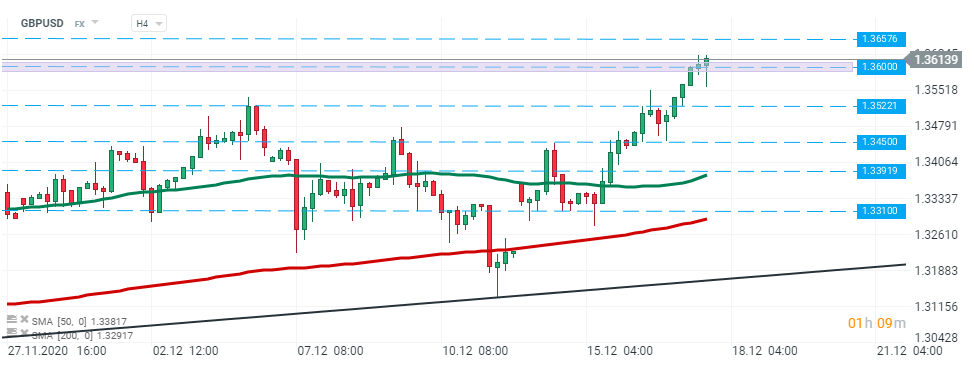- The European Parliament approved the €1.8 trillion EU budget and coronavirus recovery package
- US lawmakers close in on $900 billion Covid-19 relief package
- Bitcoin reaches new record high above $23,000
- US Dollar retreats to the lowest level since April 2018
European indices finished today's session mostly higher and EURUSD increased to a 31-month high of 1.2267. European Commission announced that vaccination across the block will start on 27, 28 and 29 December. Also signs of progress in post-Brexit trade deal negotiations and approval of the €1.8 trillion EU budget and coronavirus recovery package lifted market sentiment. UK's Minister Gove said that Britain hoped to reach a trade deal with the EU but that talks might go on until after Christmas. “We will want to ensure the parliament has a say, and a chance to scrutinises any agreement that’s reached,” Gove told a parliamentary committee. “So realistically it’s in the days immediately after Christmas,” he said of the deadline for agreement. Meanwhile, Germany recorded its highest-ever number of new Covid-19 cases and French President Emmanuel Macron tested positive for Covid-19. Bank of England left interest rates and asset purchases unchanged and Chancellor Sunak announced an extension to the furlough and loan programs aimed at helping businesses and workers through the pandemic. Dax rose 0.75%, CAC40 added 0.03% and FTSE100 finished 0.3% lower.
 GBPUSD - pound managed to stay above the $1.36, its strongest level since April 2018, on signs of progress in post-Brexit trade deal negotiations. Next target for bulls lies at 1.3657. Source: xStation5
GBPUSD - pound managed to stay above the $1.36, its strongest level since April 2018, on signs of progress in post-Brexit trade deal negotiations. Next target for bulls lies at 1.3657. Source: xStation5
The S&P 500 and the Nasdaq hit record highs and the Dow Jones rose 0.40% as investors lapped up risky assets on hopes of a US fiscal stimulus and the Federal Reserve's pledge to keep pumping cash into markets. Congressional leaders closed in on a near $900 billion package which includes $600-$700 stimulus checks and extended unemployment benefits but no aid to state and local governments and lawsuit liability protection. The US dollar continues to face heavy selling pressure this week, falling below 90 for the first time since April of 2018 as this unprecedented spending is leading to large budget and current account deficits and has made the dollar an increasingly unattractive investment. Meanwhile Covid-19 cases in the US increase at a record pace. On Wednesday alone, more than 247,000 new infections were confirmed and deaths soared to a daily record of 3,580, while hospitalizations rose for the 19th straight day.
Bitcoin hit another all-time high after first shattering the $20,000 level on Wednesday. It rose more than 8% to $23,500. Investors are attracted by its momentum - it is up 200% this year - and its purported resistance to inflation because of its limited supply.
US crude futures are trading 0.8% higher around a nine-month high of $48 a barrel, while Brent contract rose over 0.5% above $51 a barrel, a level not seen since early March. Elsewhere, gold futures rose 1.25% around $ 1,888/oz, while silver is trading 2.8% higher, above $26.00/oz.

Silver – yesterday price broke above the downward trendline and major resistance at $25/oz and the upward move is being continued today. Currently silver is testing resistance at $26.00. If the current sentiment prevails, the upward move could be extended to the $27.50. Source: xStation5

Daily Summary - Powerful NFP report could delay Fed rate cuts

BREAKING: Massive increase in US oil reserves!

US OPEN: Blowout Payrolls Signal Slower Path for Rate Cuts?

BREAKING: US100 jumps amid stronger than expected US NFP report


